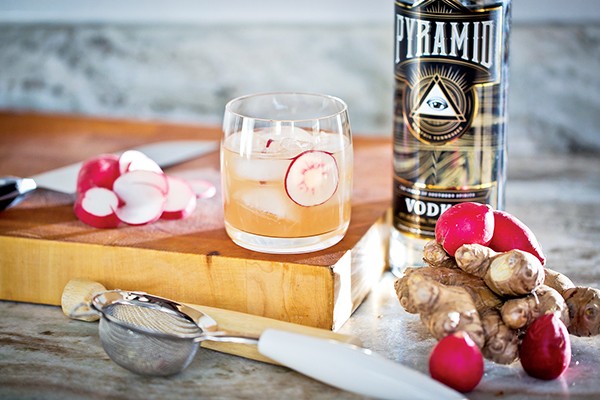Pyramid Vodka, the “grain to glass” distillery located just a stone’s throw from CC Blues Club on Thomas Street, uses Delta-grown corn and Memphis artesian water to produce its vodka, which won the platinum, or “best in class” award, at the 2015 Spirits International Prestige, an international consumer-tasting competition.
“These are superior ingredients,” CEO Alexander Folk told me in Pyramid’s tasting room one afternoon last week. “The Delta is the most fertile farmland in the world, and Memphis water is one of the best. We’re getting really pure flavors here.”
Corn is milled, cooked, and fermented in the 25,000-square-foot building, originally built to service the New Chicago neighborhood’s long-gone Firestone plant. “It was once an adhesive factory,” Folk explained. “This area is historically very industrial, and the building, with its 20-foot ceilings and floor drains, is perfect for us.”
Even the waste goes to use. During my visit to the distillery, farmer Tim Ammons of Oleo Acres in Stanton arrived to pick up the recycling — two tubs of mash that he will use to feed his pigs. Other farmers reuse the methane produced at the distillery to keep their greenhouses warm.
Out on the distillery floor, Carson Duffy and Jacob Reed walked me through the vodka-making process. First, corn is run through a gristmill three times — to be exact. Reed, the production manager, processes 30,000 pounds of corn every six weeks. After cooking the mash for six hours, yeast is added. Reed ferments “on the grain” instead of separating the starches from the liquid. It’s like using pasta water to flavor your sauce instead of water from the tap. “The longer the water sits in the grain, the more flavorful it is,” Reed says. From here, it’s all science: Starches break down into sugars, enyzmes are added, and the sugars are transformed into alcohol. Once cooled, everything is dumped into a feeder tank and pumped through a stripping column, where the alcohol is pulled from the mash.
The distilled alcohol is weighed, and Memphis water, stripped of chlorine and fluoride, is added to get the product to 80 proof. Finally, it’s filtered, 250 gallons at a time, through burnt coconut shells no fewer than five times.
Then all six staff members do a blind taste test. If everyone agrees it’s on target, it’s bottled and shipped off to market.
A brand-new still, designed, built, and installed last month by Montana-based Headframe Stills, brought the continuous distillation process to Pyramid. That means that instead of cooking in 500-gallon batches, Reed can cook two gallons per minute. Continuous distillation requires a smaller footprint than batch distillation, it’s more energy efficient, and it cuts the production time from six weeks to two weeks.
Previously, Reed had to monitor the process by smell and taste; now, he can track the boiling points of the unwanted “bottoms” and “heads,” and the valuable ethanol, which makes up 95 percent of Pyramid Vodka, via a computer screen. The old batch still, which will be sold, produced 5,000 cases of vodka a year. The new still has the capacity to produce 160,000 cases annually, which could launch Pyramid beyond the regional market.
You can find Pyramid Vodka at dozens of liquor stores and restaurants in Memphis, Nashville, Knoxville, Chattanooga, and across the state of Arkansas. Better yet, stop by the distillery yourself for a free tour. They’re offered Wednesday through Friday at 10 a.m., 11 a.m., noon, and at 1 p.m. on Saturdays. Tours run about 45 minutes and include a tasting for visitors over 21. For more information, go to pyramidvodka.com.
 Justin Fox Burks
Justin Fox Burks